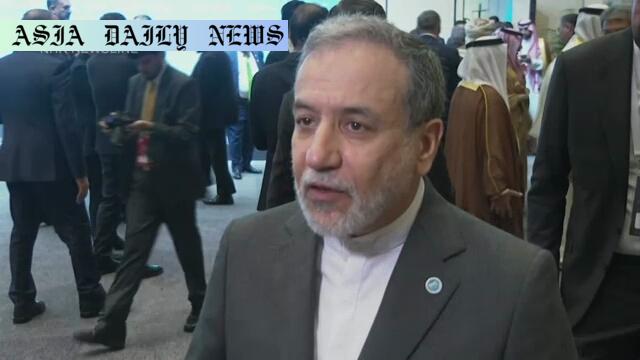Nuclear Attacks: Iran’s foreign minister condemns US strikes on peaceful nuclear sites as grave breaches of international laws.
- Nuclear Attacks by the US on Iran condemned as outrageous.
- Iran calls for global alarm on international law violations.
- Iran promises to defend its sovereignty using all options.

A Troubling Development: US Strikes on Iran’s Nuclear Sites
The recent US strikes on Iran’s nuclear facilities have escalated tensions in an already volatile region, raising significant concerns about international law, sovereignty, and global stability. Iranian Foreign Minister Abbas Araghchi has termed these attacks “outrageous,” pointing to direct violations of the UN Charter, international law, and the Treaty on the Non-Proliferation of Nuclear Weapons (NPT). This development follows an announcement by US President Donald Trump, claiming justification for the attacks while highlighting the alleged threats posed by Iran. However, such actions draw sharp criticism globally, with Iran vowing to defend its sovereignty and interests proactively.
Araghchi’s condemnation emphasizes the severity of the situation, stating that the attacks set a dangerous precedent for international relations. By targeting a nation’s nuclear installations—which Iran maintains are peaceful—the United States risks undermining not only existing non-proliferation frameworks but also its credibility as a member of the United Nations Security Council. The Iranian Foreign Minister warned that such “extremely dangerous, lawless, and criminal behavior” requires urgent attention from all UN members to prevent further erosion of international norms.
The Broader Implications on International Law
The conflict surrounding the US strikes on Iran transcends mere geopolitical disputes; it represents a fundamental threat to the principles of international law and global governance. The UN Charter strictly prohibits the use of force except in cases of self-defense or with the explicit approval of the Security Council. Iran’s leadership has been swift in pointing out that the US attack lacks any such legitimization, branding it a unilateral action that disregards multilateral agreements like the NPT, an essential instrument to prevent nuclear proliferation globally.
Critics argue that the US actions run contrary to the very foundations of the modern international order. The NPT’s framework is based on cooperation and trust, principles that are undermined when power dynamics overshadow mutual respect. The international community, especially member nations of the United Nations, must now grapple with the dilemma of addressing such breaches effectively. Failure to act meaningfully could embolden other nations to pursue similarly aggressive policies, destabilizing the fragile balance maintained by international cooperation.
Iran’s Response: Sovereignty and Defense
In the wake of the attacks, Iran has declared its intention to take all necessary steps to safeguard its sovereignty, interests, and people. Quoting provisions in the UN Charter that allow for legitimate self-defense, Araghchi warned that Iran reserves the right to retaliate. Meanwhile, the government of Iran is likely to seek diplomatic channels to highlight its grievances further, using global forums such as the United Nations to demand accountability for what it perceives as a grave injustice.
Analysts expect Iran to bolster its regional alliances and enhance its defense mechanisms. At the same time, the strikes have amplified calls for Iran’s allies, including countries critical of US aggression, to rally behind the Middle Eastern nation. This dual approach—of diplomacy and preparedness—could redefine how states respond to unilateral actions and potentially reshape geopolitics in the region.
As the situation unfolds, the global community will closely watch the responses from key players such as China, Russia, and the European Union. Their position on the matter may influence the international landscape significantly, especially if calls for accountability gain traction. Failure to address such incidents effectively risks exacerbating tensions and further undermining the international rule of law.



Commentary
Unpacking the Implications of US Strikes on Iran
The US strikes on Iranian nuclear sites have sparked widespread concern and outrage, highlighting the fragility of international relations at a time when global cooperation is crucial. At the core of this issue lie questions of legality and the erosion of mutual respect between sovereign states. By targeting Iran’s nuclear facilities, the United States has not only intensified local tensions but also set a troubling precedent that could embolden other nations to disregard international law.
One cannot overlook the severe ramifications of these unilateral actions on global stability. The NPT, a cornerstone treaty aimed at preventing nuclear proliferation, risks being undermined if violations continue unchecked. Most concerning is the potential ripple effect of these actions—if one superpower bypasses established norms, what stops others from following suit? The resulting chaos could destabilize an already fragile world order, leading to unchecked aggression and declining trust in multilateral frameworks.
Iran’s Defiance and the Path Forward
Iran’s response to these strikes has been forceful yet measured, underscoring its commitment to sovereignty while urging the global community to recognize the seriousness of the situation. The call for multinational intervention emphasizes the need for collective accountability and adherence to international norms. Given the circumstances, the UN faces a critical test of its relevance and effectiveness in addressing such matters. How it navigates this issue may set the tone for future responses to similar crises.
The broader takeaway is that mutual respect and dialogue remain the only sustainable solutions to such conflicts. Ignoring these principles not only puts individual nations at risk but also jeopardizes global peace. The only way forward is through active engagement, respect for international law, and a commitment to multilateral problem-solving mechanisms.